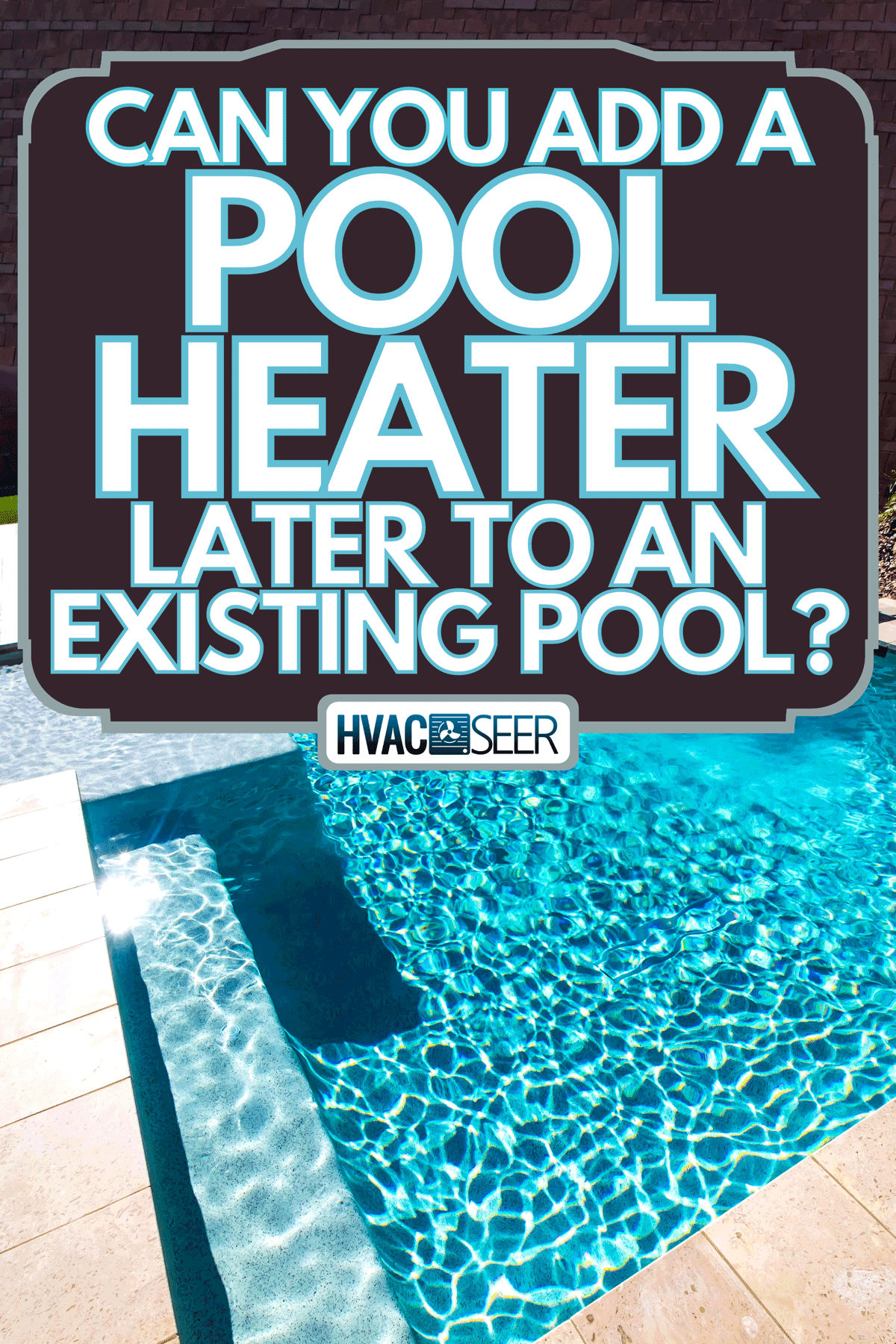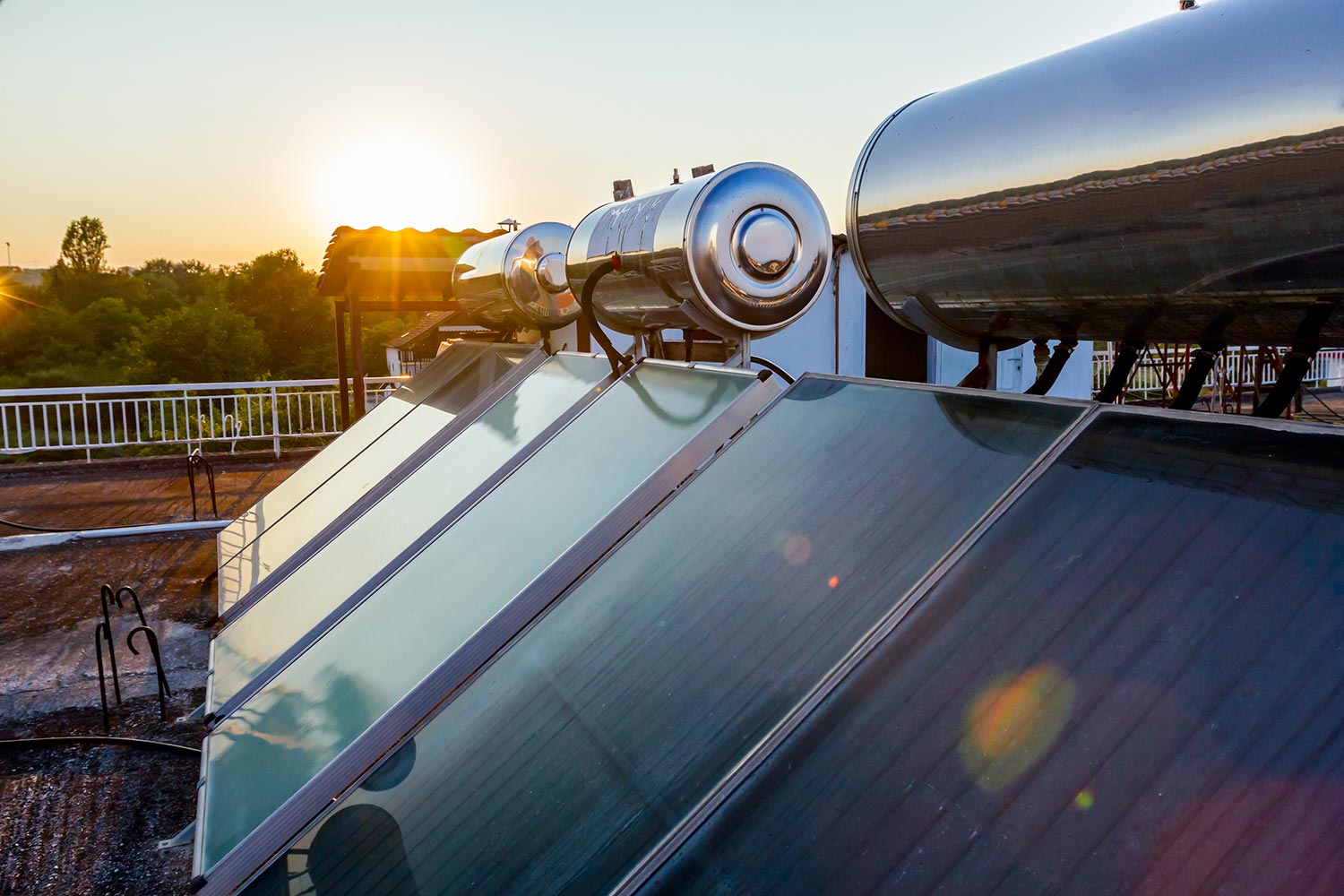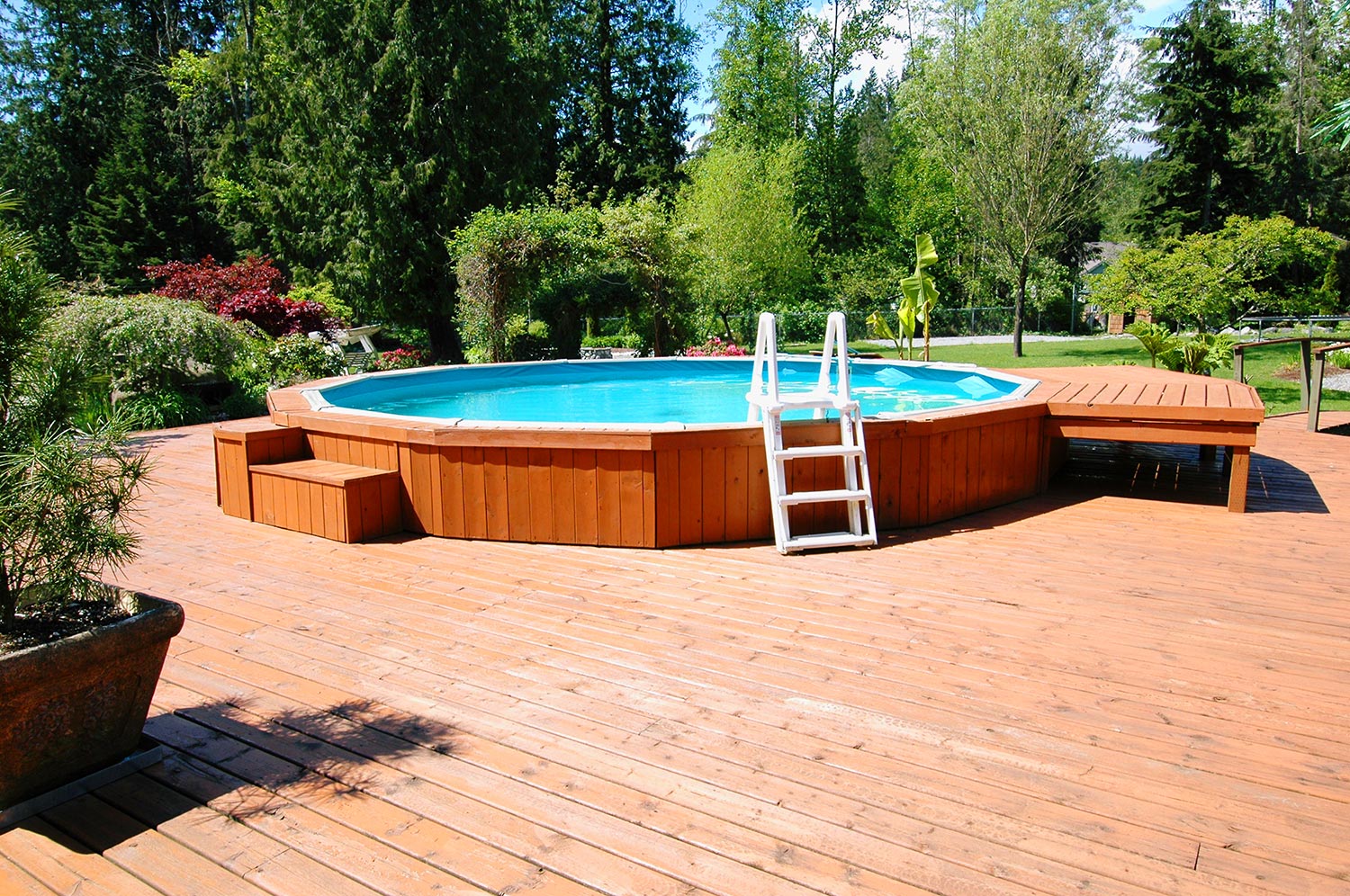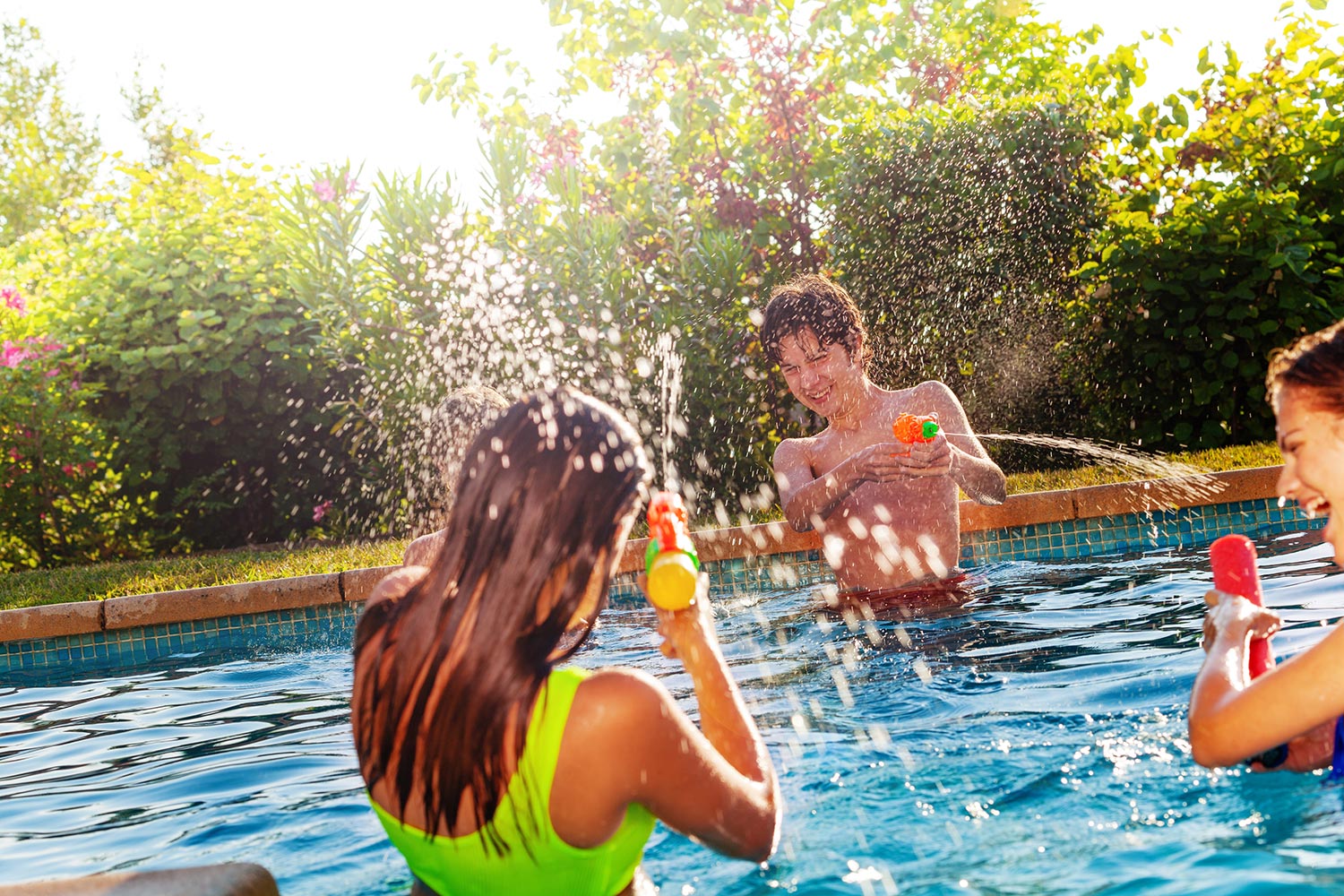A heated pool can add a few more months to your pool season. However, can you add a pool heater to an existing pool? Let's find out below.
You can add a pool heater to an existing pool. Homeowners can choose to add a solar heater, electric heat pump, or a gas/propane heater to their pool. By doing so, you can keep your pool heated during the cold seasons.
When adding a pool heater, there are several things to consider. This article will look at the different types of pool heaters and their pros and cons. In addition, we will answer other frequently asked questions about heated pools, so read on!

Can You Add A Pool Heater Later To An Existing Pool?
Yes, you can add a pool heater to an existing pool. It is not uncommon for homeowners to have the desire to heat their backyard pools later in life. You can choose from gas/propane, solar or electric heat pumps that are suitable for heating your current pool.
However, there are advantages and disadvantages to each. Let's take a look at them below:
Electric Heat Pump
An electric heat pump is a popular choice. It heats your pool quickly and effectively, and it is relatively inexpensive to run. However, it won't heat your pool if the weather turns cloudy and cools down outside. The only thing that will happen is the water temperature will drop.
The reason being is that electric heat pumps work by taking the outside air and distributing it into the pool through a series of fans and filters. Therefore, if the temperatures drop below 50 degrees, the heat pumps' performance will decrease.
So if you want to heat your pool during the cold winter months, then an electric heat pump may not be the best option.
Solar Heater

Solar heaters are the most environmentally friendly way to heat your pool. In addition, they cost almost nothing to run after they are installed. However, most solar heaters won't heat the pool to a temperature suitable for swimming until most pool water has been warmed.
Solar-powered heaters rely on sunlight to warm up your pool. There needs to be plenty of direct sun each day for it to work correctly. So if you live in an area with a lot of cloud cover, this might not be the best option for you. Also, you won't use your heated pool as quickly due to the longer heat times.
In addition, solar heaters have the most expensive initial cost. Expect to pay anywhere from $3,000 to $7,000 for a solar heater installation.
Gas/Propane Heater
Gas or propane heaters are the most popular type of pool heater. They provide an ideal way to heat your pool quickly and efficiently, in addition to being relatively affordable. Gas/propane heaters come in several sizes. You can choose one that is right for your pool size based on the manufacturer's recommendations.
This type of heating method has the best performance out of all three. It also allows you to heat your pool, whether it is sunny or cloudy outside.
However, gas and propane heaters have a more significant impact on the environment. In addition, if you are installing a gas heater to an existing pool, you will need to install a gas line which can be expensive. Lastly, gas is more dangerous than electrical and could cause a fire.
Whichever of the three heating options you choose for your pool, using a solar pool cover is a good idea. The cover will reduce heat loss and the number of chemicals needed to keep your pool safe.
Can you add a heater to an above-ground pool?

Luckily, you can add a pool heater to an above-ground pool. So whether your current pool is round, oval, or rectangular, the shape doesn't matter when heating your backyard swimming spot.
You can choose between a gas, solar, or electrical form of energy. Also, like inground pools, you can still maintain the heat and save energy by using a pool cover when the pool isn't in use.
How far should the pool heater be from the pool?
A pool heater should be close to the filter and 25 feet away from the pool. If you install the pool heater too far from the pool, it could cause heat loss.
Your pool heater should have at least 24 inches of clearance around it. You don't want any obstructions around your pool heater that could keep it from performing correctly. In addition, you are more likely to have debris get into your system.
How much does it cost to add a heater to an existing pool?

The cost to put a pool heater in an existing pool will vary depending on the type of heater you are installing. Nonetheless, homeowners can expect to pay $1000 to $4000 on average for a pool heater.
However, it can be costly, especially if you add a pool heater to an existing inground swimming pool. In addition, the price will increase due to gas line installation costs needed for gas heaters.
In addition, if you go the solar heater route, it can be more expensive if you have a large pool. However, once the solar panels are installed, you will be able to make your initial investment back due to its low-energy costs.
Can you install a pool heater yourself?
You can install your pool heater. However, you should not attempt to do this if you are new to plumbing or electric work. Homeowners who want to go the self-install route should also be prepared for possible additional costs due to parts and labor needed.
If you don't feel comfortable installing the pool heater yourself, you should hire a professional. This is especially true if you are installing gas lines.
Is it worth getting a pool heater?

Whether or not you should get a pool heater will depend on your situation. If you constantly use the pool year-round in all types of weather, then it is worth getting a pool heater.
However, if you only use the pool during the warmer months, it may not be worth the upfront costs. This is especially true if you live in an area that doesn't get too cold.
Regardless of your decision, using a solar pool cover during the cooler months will help maintain the heat so you can use it come summertime.
Can you use a timer on your pool heater?
You can use a timer on your pool heater. It is up to you if you want to install it or hire an electrician to do it for you.
Using a time for your pool heater is the most energy-efficient way to heat your pool. However, turning your pool heater off will cost you more money in the long run. This is because a pool temperature can drop as much as 20 degrees, and it will take an immense amount of energy to get back to the proper temperature.
In addition, having your pool heater run constantly uses a lot of energy and adds extra stress to the system. Using a pool heater time solves this problem by only turning it on when the pool temperature drops below a specific temperature.
So if you are going to add a heater to your existing pool, then it is a good idea to add a time to the system if it doesn't already have one.
Do solar rings work to heat a pool?
If you don't want to pay the upfront costs for a pool heater, then using solar rings is an inexpensive way to heat your pool. The solar rings work similarly to a solar cover by trapping the sun's heat and transferring it to the water in the pool. Solar rings can trap as much as 50% of the sun's energy and produce as much as 21,000 BTUs.
They are super easy to install and work well. They are perfect for pools that get at least four hours of direct sunlight a day, like California or Arizona.
However, if you live in an area with less sun, they will not be as effective.
How long do pool heat pumps last?
Pool heat pumps last a long time. The average life of most pool heat pumps is between 10 and 15 years, with most homeowners replacing them due to upgrading their pool equipment rather than for any issues with the pool heat pump.
However, it is essential to maintain your pool heat pump properly. Most heat pumps are not self-cleaning, so it is important to clean yours regularly.
Final Thoughts
If you consider adding a pool heater to your existing pool, then know you have options. Deciding which to go with will depend on how much you use your pool, budget, and the climate you live in. Contact a local specialist if you are still unsure which heating source to go with.
For more articles like this one, then check out our website:
Pool Heater Smoking – Is This Okay?
